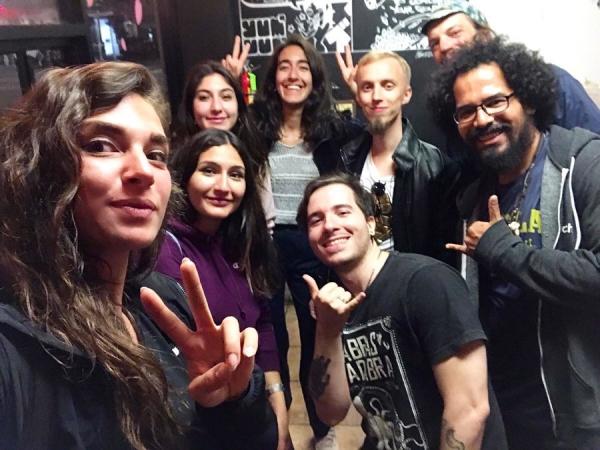Everything You Need to Know About Free Hostel Stays

Imagine this: you start your morning on a white sand beach in Greece, and end your day watching the sun set from a mountaintop in Turkey. The next day, you spend the afternoon exploring Istanbul with new friends from all over the world. That night, after another amazing sunset, you start planning your next adventure with your new friend from Bosnia, who you just met but it feels like you've known each other your whole life, and you're planning on exploring Western Europe together next month.
You're thinking, "Yeah, sounds real great, too bad I ate ramen for three different meals this week and most of my paycheck goes to my rent every month."
We hear you! BUT! There IS a way to make everything we just said a reality, and it doesn't take very much money at all. We’re talking about traveling by getting free stays in hostels all over the world. For those of you that don’t know, a hostel is a budget-friendly shared accommodation for backpackers, travelers, and anyone who wants to save some money while traveling and make some new friends in the process. In hostels, you share a dorm room with other travelers. Most hostels usually offer free breakfast, and also free activities so you can explore the area you’re in with a group.
This blog post will show you how to get started with the latest trend called “Slow Travel.” We will show you how to use hostels as your stepping stones from continent to continent by finding free stay opportunities in hostels and how to successfully approach hostel owners and managers to get fantastic discounts in hostels.
We’re not going to lie to ya: This post is long, and there’s a lot to get your head around. If you read it all the way through to the end, and apply it to your life on the road, we promise you will find yourself with a free stay in a hostel.
But! It will also tell you how to find free stays in hostels, so we hope you stick with us.
Please note: there is no straight path to finding sure-fire free stay opportunities in hostels. The world is a complicated maze of rules, culture and laws, and few people are willing to put into writing what people in a particular country actually do, if these norms conflict with the country’s laws. Therefore, if you are looking for a step-by-step instruction manual on how to get free stays in hostels, you won’t find it. If it was easy, everyone would be doing it. Nearly everyone wants free accommodation while they travel, but few people are intrepid enough to make it happen for themselves.
Reading this post is obviously not a guarantee that you will end up with a free stay in a hostel. HOWEVER, armed with the knowledge this post provides, you will be better equipped to navigate through all this uncertainty, find some free stay opportunities that are largely unadvertised to mainstream travelers, and find an approach to doing this that works for you. What are you waiting for?! Let's get started!
Photo credit: Ready Jess Go
Finding free hostel stays in a nutshell
The first thing to understand about free hostel stays these opportunities are rarely advertised. If they were, hostels would be swamped with everyone asking to stay for free. And, let's face it, if a hostel lets everyone stay for free, they aren't going to be able to pay the bills. If they don't pay the bills, the hostel is not going to survive. Many hostels will also not tell you about free stays if you call or email them. Think about it. They don't know you, so how can they possibly know if you will be a good fit for their hostel community.
That means the #1 best way to find free hostel stays (or paid jobs for that matter) is to show up a the hostel with your smiling face. Now that does not mean cold calling and interrupting them while they are checking in guests. It means, paying your money and staying there as a guest. This way they can get to know you in a genuine way. Once you are a guest, you'll be able to experience the hostel community firsthand and decide if it's a good fit for you. You'll learn who the boss is and who has the authority to offer free stays. Once the manager gets to know you, your personality and how helpful you are then, and only then, it might be a good time to ask the manager if you can help around the hostel. A free stay will often start with a single night. If you are helpful and friendly to the hostel family, the manager or owner may decide to offer you a longer stay.
However, the rules for free stays in hostels are NOT the same all over the world. This means that free stay opportunities in hostels will largely depend on a variety of factors including (but not limited to) the type of hostel, the rules, laws, and culture of the country where the hostel exists, and the personality and philosophy of the owners and managers of the hostel. Sounds like a lot? Don’t worry! That’s why we’re here. Let’s break each of these factors down below.
Know your audience - Understanding the different types of hostels
Hostels are structured differently depending on the part of the world they’re in and how the principal people involved started them. Depending on the country, the business structure of the hostel will have a large impact on whether you’ll be able to help out in the hostel in any capacity - paid hostel jobs, free stays, or volunteering in exchange for a bed.
There are, of course, A LOT of different types of business structures, and we don’t want to overwhelm you. We’re here to help you, not give you a headache! So, without getting too deep into all the different types of business structures, let’s talk about the main three types of hostels, how they’re structured, and how this might affect your free stay opportunities.
Photo credit: Pacific Tradewinds Hostel
The three different types of hostels:
-
“For-profit”
As you can probably guess from the name, these hostels are mostly in it for the money. They usually have a more corporate business structure and culture. “For-profit” hostels also tend to be larger, and therefore have strict rules they have to follow. Because of this, it’s more rare to find free stay opportunities in “for-profit” hostels. However, that doesn’t mean they straight-up don’t exist. We’ll provide some example opportunities later in this post.
-
“Non-profit”
“Non-profit” hostels are those that strive to help the traveler community. They usually have an altruistic mission, meaning they exist to help others. Whereas “for-profit hostels” are those who truly operate as a business, non-profit hostels are hostels that care more about providing an affordable place for travelers to stay and take action within their hostel to make sure they have a true sense of community within the hostel. In some countries, hostels need to have a “non-profit” status before they can formally accept volunteers.
-
“Not just for profit”
We frequently like to call these hostels “Lifestyle Hostels.” These are hostels where the owners are allowed to take profit from the hostel, but they are not just operating the hostel because they want to make money. Sometimes these owners have an altruistic mission (just like the principals of non-profit hostels), and sometimes they operate their hostel simply to meet other great people in the travelers’ community. These hostels tend to be smaller, and therefore things are done more informally when it comes to making the community work. These are the hostels in which free stays are the most common.
Photo credit: Pacific Tradewinds Hostel
Know the law! Understanding the differences between laws in different countries
Okay! Now that we’ve talked about the different types of hostels, now we can go over the different laws different countries have when it comes to volunteering or working in a hostel.
This will come as no surprise to seasoned travelers, but the rules, laws, customs, and culture of a given country are pretty different throughout the world. For example, in some countries, travelers are given the freedom to volunteer their time toward any project or endeavor they desire. In these countries, it does not matter if the person the traveler is helping is a friend, a business or a non-profit. In other countries, however, travelers are only allowed to volunteer for “Non-Profit” charitable organizations.
There are also countries in which bartering and work/exchange is 100 percent legal. In some countries, bartering and exchanges between people are quite normal and not frowned upon in the slightest.
Different countries define jobs and work/exchange opportunities differently. In some countries, a job is defined as “work in exchange for money.” However, in other countries, if you are simply trading products or services, it’s not considered a job at all. The definition of an “employee” also varies from country to country, and will depend on lots of factors that are specific to the laws in that specific country.
Some countries also allow for “casual labor” if the total cash being paid to a worker is less than a certain amount per year. However, in other countries, legal work is never paid for in cash. We know, this is a lot to take in! But in the end, you'll know how to start looking for free stays in hostels and make your travel dream a reality. Doesn't that kind of sound worth it?
Culture plays a big part in what is and isn’t allowed in every country. Sometimes the culture dictates that all laws must be followed exactly, and in other countries, some laws are merely a suggestion. This is true for the laws in all facets of a country - from traffic laws to the laws surrounding labor, volunteering, and work/exchange.
You’re thinking, “Cool, but which countries are barter and work/exchange legal in? Which countries specifically can I go volunteer in?”
Never fear! This blog post is mostly just to tell you there are laws surrounding work/exchange, so that you know what you are getting yourself into. If we went into the labor and volunteer laws in every country, this blog post would be even longer! But, the awesome website Working Traveller lists the volunteer visa requirements for many countries on every continent in order to better help you figure this out.
Photo credit: Ready Jess Go
Understanding the categories of hostel opportunities
Now that we have shown you how different countries, cultures and hostel structures can affect everything, we can finally tell you about the types of hostel opportunities that might help you change a short vacation into an epic journey!
- Paid hostel jobs
The first type of hostel opportunity - and probably the easiest to understand - is a paying job. These are just like any other job you might find in the world, except that it’s for a hostel. For the most part, a paid job will give you better security but it’s usually also subject to the most regulations. With all hostel opportunities, it’s ALWAYS advisable to research the laws of the country, but this is especially true of you are looking for a paid hostel job. These are jobs like hostel managers, social media managers, and accountants.
Generally, you will need to have the appropriate visas and/or work permits (or be a citizen of that country) before applying for a paid hostel job - just like any other job. However, if you have working permission, you can easily apply for a hostel job online in advance of your arrival at the hostel.
Although there are always exceptions, in our experience, the workers at larger “for-profit” hostels will almost entirely be paid employees. Working for cash in hostels sometimes happens but it’s usually in countries that allow for “casual work” or “contract work” for a limited about of hours or money per year.
These jobs may or may not be live-in jobs. In some cases, a certain number of hours is compensated with free room and board. However, in other cases, you must pay for your own accommodation and food out of your wages.
A hostel may be more likely to be able to pay you if you are a skilled professional (i.e. a photographer, videographer, social media marketer, etc.) that can provide the hostel with an invoice for your services.
- Work/exchange opportunities
This type of opportunity is one that many savvy travelers know about and use to extend their travel budget. In some countries, as long as money is not exchanging hands, this type of opportunity is not considered a proper “job.”
Work/exchange opportunities usually mean that you volunteer a certain number of hours per day or week in exchange for accommodation and sometimes food. In our experience, the number of hours you are required to work will depend on how difficult the work is, but it’s typically between 2-6 hours per day. For example, as cleaning the hostel is a more difficult task, volunteers may be asked for clean for two hours a day in exchange for accommodation. If a volunteer’s main task is to socialize with guests, however, they be asked to do this for six hours a day, as this is a much easier task than cleaning.
If you are interested in a work/exchange opportunity at a hostel, it is important that you understand that not all hostels can offer this. Like we said before, in some countries, only “non-profit” hostels can legally offer work/exchange opportunities to travelers. This is because these travelers are technically a volunteer for a charity, and they are charitably giving you a free place to stay.
In other cases, it may be possible for the manager of a “for profit” hostel to offer work/exchange opportunities to travelers, but only under certain circumstances and subject to certain rules. Here is where it gets really complicated! Keep sticking with us! We’re almost done!
Sometimes, if you are trying to “apply” for a work/exchange position online, and your request contains certain words or phrases, the hostel owner is required by law to treat the relationship as employment, which would therefore be subject to the regulations and laws of that country. For example, if it’s illegal in a particular country to provide accommodation in exchange for work, and you call the hostel asking about work/exchange opportunities, they will legally have to say they don’t provide those. Since you have no idea how and under what circumstances your request would trigger these regulations, it’s always best to inquire about work/exchange arrangements in person at the hostel, instead of over email or even over the phone.
Alternatively, even if a hostel is legally required not to provide work/exchange, if you show up at the hostel as a paying guest, make friends with the manager, and prove yourself to be helpful for a few days, the hostel may offer you a free stay if you continue helping out around the hostel whenever you notice things that need to be done. The difference is that work/exchange requires that you work a certain amount of hours a day or week in exchange for a bed, but in this arrangement, you help out when you see things that need to be done, and the hostel rewards you with a free stay. Yes, these kinds of opportunities exist! We’ll go more into them in an upcoming blog post.
That said, you can sometimes “start the conversation” in advance of your arrival with the hostel manager by using sites such as HostelJobs.net, HelpX.net, Worldpackers and Working Traveller. However, note that not all hostels are legally allowed to advertise opportunities on these sites, so again, it’s best to show up in person. If you do make contact with a manager on these sites, they will usually want to meet with you online. But again, be careful of what you ask for and how you classify your relationship with the hostel so you don’t unknowingly trigger any regulatory traps. Simply show your personality and interest in helping out in an amazing hostel community, and leave it up to the manager to let you know how the volunteer and work/exchange arrangements function at their hostel and in their country.
Photo credit: Ready Jess Go
- Volunteer opportunities
In the past, hostels used to be almost entirely “non-profit.” Most hostels used to be operated by the International Youth Hostel Foundation (now known as Hostelling International), or a number of other nonprofits promoting educational or international peace goals. Today, many hostels are still operated by Hostelling International or other nonprofit organizations. In fact, Hostelling International is one of the largest and most well-known hostel operators in the world. You’ve probably stayed in one!
Like most charities, nonprofit associations and religious organizations, it’s common for people to volunteer their time and skills to help the nonprofit with their mission. Of course, when someone volunteers for a hostel, it’s because they care about the hostel and the traveler’s community. Traditionally, volunteers don’t expect payment or anything else in return. (Hence the title “volunteer.”)
Hostel volunteers do this because they’re passionate about helping an international travelers’ community, which in turn fosters world peace and understanding between different nationalities, races and cultures.
However, frequently, the hostel manager may wish to support volunteers in their hostel by giving them a free place to stay and maybe even food. Sometimes this charity to their volunteers also helps support the mission of the hostel.
Although the term “volunteering” is most often associated with nonprofit hostels, in some countries people are free to volunteer their time and skills anywhere they want, including for for-profit businesses. In fact, sometimes “volunteering” is the operative word when “Work Exchange” is prohibited or has more restrictions. Once again, these are the reasons that you should not expect to see all volunteer opportunities listed online, and it’s always best to inquire in person with the manager. We hope this is all making sense!
-
Friends helping friends
Wahoo! If you made it this far, you’re a rockstar! In fact, if you made it this far, and you haven’t stayed at Pacific Tradewinds yet, here’s a $10 promo code off your first three-day stay with us.
So! We mentioned this briefly up there, but the most common way to find free stays in hostels is to just show up and be friendly and helpful wherever you go without any expectation of getting paid. Since the beginning of time, humans have engaged in mutual “back-scratching” among friends. Modern societies and corporate culture have indoctrinated people into a transactional mindset where everything must be paid for. This has also left many people lonely and isolated from their fellow human beings. But! There are many communities that are still community-based and not so focused on transaction. Many hostels still operate like this.
For example, imagine you notice an elderly neighbor needs her lawn mowed. Because you want to be helpful, you might offer to help her and mow her lawn. You do this out of the kindness of your heart, and you don’t expect anything in return. Then, a few days later, this neighbor makes a casserole and some cookies, and delivers it to your doorstep. She doesn’t do this as payment for the lawn mowing, but as an expression of her love of you. This gift makes her feel great. The awesomeness continues. This is how friendships develop.
In the above example, there was no expectation of reciprocity or “Quid Pro Quo” (this for that). It was not a transactional relationship - it was a loving relationship.
Whether you realize it or not, this is the stuff hostels are made of. The best hostels are not simply cheap places to stay. They are living communities where humans help each other and find friendship through generosity and giving.
Many “not just for profit” hostel owners understand this and continually strive to foster this kind of atmosphere. At Pacific Tradewinds Hostel, we routinely gift free stays to travelers who we think are deserving of them. Perhaps they spontaneously cook a yummy meal for our guests without asking or expecting anything in return. Then at checkout, we surprise them with a refund.
Here at Pacific Tradewinds, we love to surround ourselves with positive people with a giving spirit. It’s kinda what we’re all about. These are the people who quickly become our friends and because our hostel is “not just for profit,” we let our friends stay for free. This is not work/exchange, it’s not really volunteering, and it’s certainly not a job!
This sort of opportunity happens all the time in hostels. There’s nothing formal about it. It’s simply friends helping friends. The next time you see lots of travelers helping out in a hostel, do not assume they are employees. Like we have said before, the way you usually get an opportunity like this is by showing up as a paying guest and being friendly and helpful. Of course, being helpful is not a guarantee that you’ll be gifted a free stay. If your friendly and helpful spirit is largely unnoticed by the hostel community, then you might be in a transactional hostel. If this is the case, check out and find another hostel. :)
Alright, so now what?
We’ve noticed that a lot of people see hostels as a business, like a hotel. This is a closed mindset. Yes, the “default world” is transactional but you should always know there are vibrant communities throughout the world where people are enjoying the act of simply helping each other. A lot of hostels are like that, and a lot of travelers don’t see or know about it. So don’t be afraid to get out there and find a hostel community that’s right for you and see where your travels take you!
We mentioned earlier that most free hostel stays are not advertised and we stand by that. However, there are a number of places where hostels do in fact advertise hostel jobs, volunteering, work/exchange, and free stay opportunities. This can help you navigate to free stays in hostels more quickly. Since you have read this far, take the next step and find out how to find free stays in hostels. Then we encourage you to read our tips on how to protect yourself and be safe while helping in hostels. Not all opportunities are everything they claim to be and you need to be smart about the opportunities you accept.





